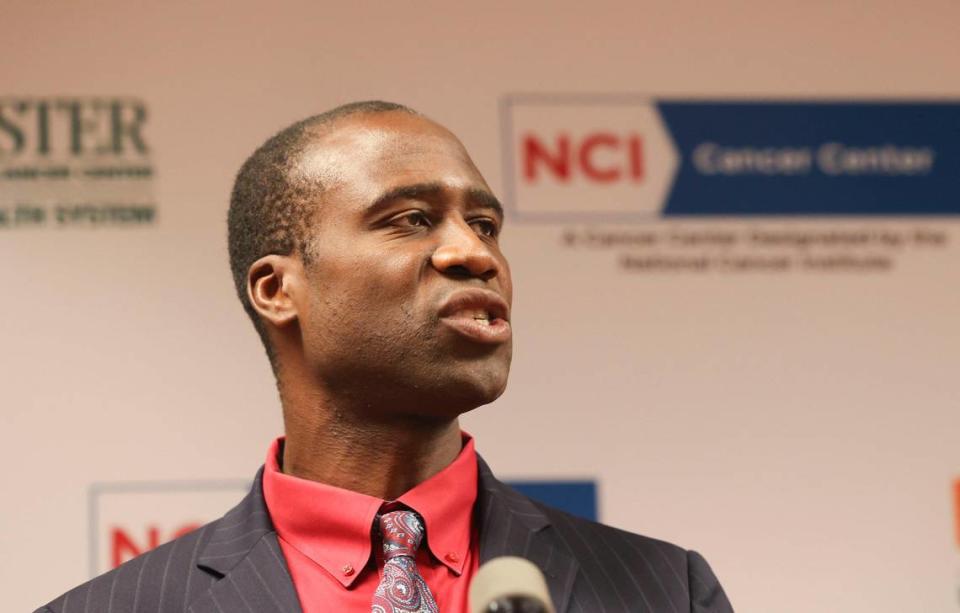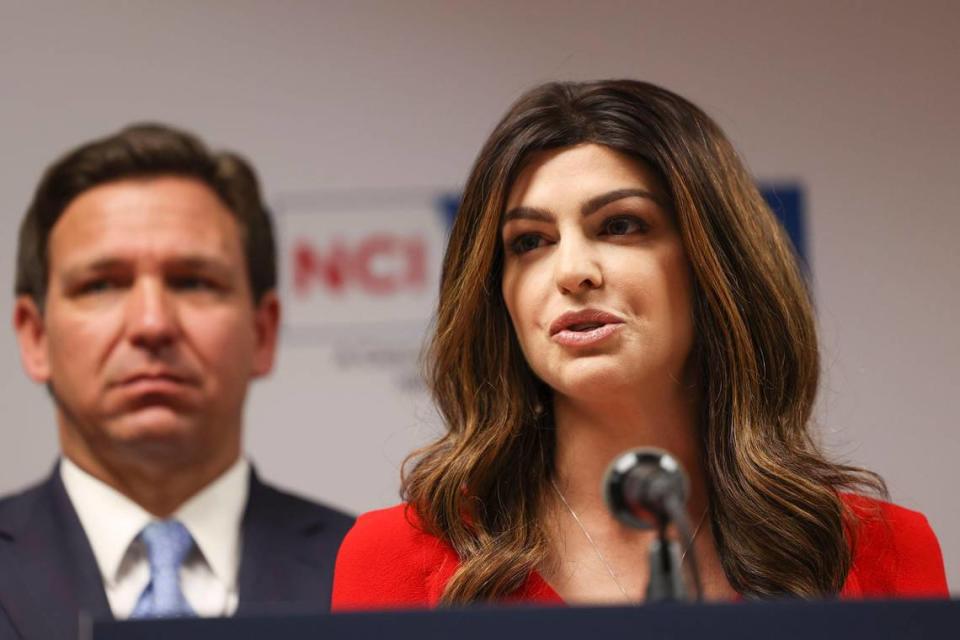DeSantis announces $100 million for Florida cancer hospitals for treatment and research
- Oops!Something went wrong.Please try again later.
- Oops!Something went wrong.Please try again later.
With cancer ranked as the second-leading cause of death in Florida, Gov. Ron DeSantis on Tuesday visited the University of Miami’s Don Soffer Clinical Research Center to announce that he will approve $100 million for cancer research and treatment in the state’s 2022-2023 spending plan — an increase of about $37 million over the current budget.
Flanked by Florida’s first lady, Casey DeSantis, a breast cancer survivor, as well as the state’s surgeon general, legislators and others, the governor spoke about his family’s personal experience with cancer and promised hope for the hundreds of thousands of Floridians who have or will face a similar diagnosis.
“We wanted to really go big. We wanted to make something that would be very, very meaningful and very, very historic,” DeSantis said. “So with the first lady’s help, we proposed a record $100 million for Florida’s top cancer centers.”
Funding for research and for treatments
Three Florida cancer hospitals — Sylvester Comprehensive Cancer Center at the University of Miami Health System, Tampa’s H. Lee Moffitt Cancer Center and Research Institute, and the University of Florida Health System’s Shands Cancer Hospital in Gainesville — will receive the funding for research and medical care, the governor said.
“We really have confidence in these institutions ... to make good use of that money and to do so in a way that will have meaningful impact on the lives of the patients that they will be seeing,” the governor said.
The $100 million budgeted for the three cancer hospitals represents about a 60% increase in state funding for those institutions over the current budget and is earmarked for cancer centers participating in the Florida Consortium of National Cancer Institute (NCI) Centers Program, an initiative to improve cancer care in the state.
UHealth’s Sylvester and Tampa’s Moffitt are Florida’s only NCI-designated cancer centers, a federal designation that confers additional resources and research, much of it funded by the federal government. The designation also provides their patients with easier access to innovative treatments. UF Shands is applying for NCI designation.
The $100 million earmarked in Florida’s budget for the cancer centers comes from general revenue (about $83.6 million) and the state’s Biomedical Research Trust Fund (about $16.4 million), which is made up of general revenue and cigarette and tobacco taxes and surcharges, said Bryan Griffin, the governor’s deputy press secretary.
Griffin said the final distribution for each of the three cancer centers has not yet been determined.
DeSantis praised Florida legislators for heeding his request for additional cancer funding, which was included in the governor’s proposed 2022-2023 spending plan, dubbed the Freedom First Budget.
The governor vowed to sign the budget once he receives it — a promise that generated applause from a group of about 75 people, including cancer survivors, who had gathered in a conference room to hear the governor’s announcement.
Though COVID-19 cases are rising in Miami-Dade and elsewhere in Florida, only a handful of people in attendance wore a face mask. Asked about the potential risk to cancer survivors, who may have weakened immune systems, Florida Surgeon General Dr. Joseph Ladapo said he does not believe masking is effective at stopping the spread of COVID-19.
“If it has any effect, it’s small,” Ladapo said after the press conference had concluded.

More than 100,000 new cancer cases annually in Florida
About 115,000 new cancer cases are diagnosed and reported each year to Florida’s cancer registry, Florida Cancer Data System. Since 2014, cancer has been the second-leading cause of death in Florida, after heart disease.
Over the last eight years, DeSantis said, Florida cancer centers have provided care to hundreds of thousands of patients and educated 83,000 biomedical research trainees. He added that Florida also has “allocated more than $820 million that we’ve drawn down from the federal government” and that the additional $100 million would be significant for patients diagnosed with the disease.
Among the many Floridians diagnosed with cancer each year is Casey DeSantis, the governor’s wife, who is considered his most trusted adviser and takes an active role in the administration.
After the governor’s office announced her breast cancer diagnosis in October, the state’s first lady underwent treatment and stepped back from the public eye. She made an appearance in December at Moffitt Cancer Center to announce the governor would be requesting $100 million in cancer research and care in his budget.
Speaking about her breast cancer diagnosis last year, Casey DeSantis praised her husband and the Florida Legislature for channeling more money to research and treatment.

“Florida is going to lead the way to find a definitive cure once and for all for all types of cancer,” she said.
Casey DeSantis also spoke about the overwhelming emotion of receiving a cancer diagnosis, and the difficulty of maintaining a happy face for the couple’s three young children, who are ages 5, 4 and 2, and of shielding them from the reality of her condition.
She urged Floridians to pay attention to their health and listen to their instincts when something in their body doesn’t feel right. DeSantis said she had sought an appointment with her doctor last year due to a persistent feeling, which she described as almost a dull sensation, that something was not right.
DeSantis said her doctor did not feel any lumps in her breast and advised her not to worry about it. But because the uneasy feeling persisted, DeSantis said she decided to get a mammogram or breast scan, which revealed her breast cancer and launched her on a frightening journey to eventual recovery.
The governor announced that she was “cancer free” in March.
“I can stand before you today and say that hope is alive, God is good, never ever give up the fight, ever,” she said.

